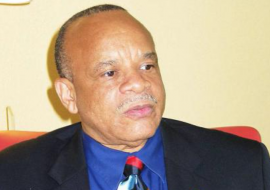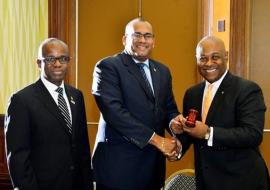Caribbean Needs Laws to Regulate Waste Disposal in Waters, CTO Head Says

Secretary General of the Barbados-based Caribbean Tourism Organization (CTO) Hugh Riley has called for legislation to regulate the disposal of waste in Caribbean waters.
Addressing the second Sustainable Conference here yesterday, Riley said the Caribbean had a responsibility to protect and preserve its water resources.
He said that water was at the core of the Caribbean's efforts at sustainability and that it was important that the necessary policies be put in place to safeguard this vital resource.
"We must never forget that we, in the Caribbean, have a duty to create policies and to engender behaviors in our people and in our visitors that will safeguard our water resources for future generations.
"We must practice sustainable water-use policies and observe appropriate waste-water management practices. We must not only enact, but also enforce legislation that regulates the proper disposal of waste in the waters that wash our shores, and we must severely punish all violators, because they endanger our health and jeopardize our children's future," he added.
The two-day conference, organized by the St Eustatius Tourism Development Foundation with support from the CTO, has as its theme "Tourism and Water: Protecting Our Common Future".
Delegates, including Governor Gerald Berkel and the Commissioner of Tourism Carlyle Tearr, will, over the sessions, discuss a number of water-related issues, including who benefits from coastal management; the risks to wildlife and water along with the tourism opportunities that come with development; and water conservation in hospitality.
In his address, Riley said it was also necessary for the Caribbean to pay attention to rising sea levels and the impact of climate change.
"That is a threat to our very existence. The scientists are warning us that a major source of concern is the effect of global warming on the rate at which sea levels are rising, and the fact that entire communities could be destroyed by coastal flooding. It's serious.
"We must pay particular attention to the preservation of our reefs, mangroves and wetlands, our rivers and waterfalls, our precious marine life and our underwater heritage. We must build structures that capture, store, treat and use water resources sensibly, including as a source of energy."
The CTO secretary general said since 2009, the Caribbean Hotel Energy Efficiency Action Program (CHENACT) has helped more than 80 Caribbean hotels to reduce their energy costs and increase their competitiveness. He said it has saved the region's hotel sector an estimated US$270 million annually in utility costs.
The CHENACT was launched four years ago in conjunction with the Caribbean Hotel and Tourism Association (CHTA), and is funded through a number of international development agencies including the Inter-American Development Bank.
Riley said the initiative is a prime example of what happens when a region creates an effective public-private partnership and provides the tools to make it succeed, adding "not surprisingly, the outcomes of the more efficient use of energy are significant".
He said it was also important for the sector to reduce carbon footprint while also aiding the sustainability of the industry and the socio-economic development of the region.
"But there's another benefit. More and more we're seeing evidence that "being green" has a growing public appeal; discerning travellers around the world are seeking out vacation destinations that pay serious attention to the preservation of the environment.
"Consequently, I believe there will come a time when the term 'travel for green' will become so ingrained in the psyche of vacationers, that we in the Caribbean will be proud that we got onboard and paid attention to issues that affect the more responsible use of our resources."
He said the CTO hopes that it can find ways of expanding the types of programs and partnerships that include a broader range of member-countries, and thereby improve the lives of even more of Caribbean people.
"Programs that allow this region to reduce our dependency on traditional fuels are the ones that will have credibility and sustainability," he said, noting also the need to share information with all stakeholders which he said would "help to ensure that we inculcate the principles of energy conservation and energy efficiency into the habits and the lifestyles of all our people".














